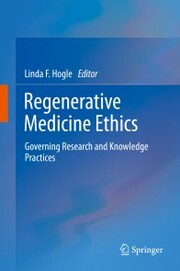-
Zusatztext
-
<p><i></i></p><p>This book puts the ethics, policy and politics of stem cells into context in a way that helps readers understand why past and current issues have developed the way they have and what the implications are for their work going forward. It also addresses emerging issues as the field progresses towards clinical and industrial uses.<br><br>While there is a superabundance of material on the ethics of embryo use and questions of embryonic "personhood," there is little that covers what practicing scientists and managers need to know in order to plan and execute responsible research. Furthermore, researchers funded by the NIH are required to have ethics training as a condition of the grant. As such, this book is an essential resource to all of these pre-professional students whether they plan to move into industry, government or academia.<br></p><p>
-
-
Kurztext
-
This book examines vital issues in the governance of regenerative medicine, including data sharing, patenting of human biological material, managing collaborations, obtaining consent from biospecimen donors, and accessing biorepository data.
-
-
Autorenportrait
- <p><b>Linda F. Hogle</b> is Professor of Medical Social Sciences in the School of Medicine& Public Health at the University of Wisconsin-Madison and Fellow at the Wisconsin Institutes for Discovery. Her research includes analyses of social, ethical, and legal issues in emerging cell-based and biomedical engineering technologies, as well as concepts of risk in innovative science as understood by governance bodies. She has served as an advisor to several international research consortia focusing on stem cell and regenerative medicine.</p><p><p>Contributors include:</p><p><b>Sean P. Palecek</b>, University of Wisconsin-Madison, Department of Chemical and Biological Engineering, WI</p><p><b>David Schaffer</b>, University of California-Berkeley, Department of Chemical and Biomolecular Engineering, CA</p><p><b>Peter W. Zandstra</b>, University of Toronto, Institute of Biomaterials and Biomedical Engineering, ON, Canada<b></b></p><p><b>David B. Resnik</b>, National Institute of Environmental Health Sciences, NC</p><p><b>Tania Bubela</b>, University of Alberta, Department of Public Health Sciences, AB, Canada</p><p><b>Amrita Mishra</b>, University of Alberta, Department of Public Health Sciences, AB, Canada</p><p><b>Debra J. H. Mathews</b>, The Johns Hopkins University, Berman Institute of Bioethics, MD</p><p><b>Kevin E. Noonan</b>, McDonnell Boehnen Hulbert& Berghoff LLP, IL</p><p><b>Pilar N. Ossorio</b>, University of Wisconsin-Madison Law School, WI</p><p><b>Jessica von Reyn</b>, University of Wisconsin-Madison Law School, WI</p><p><b>Nancy M. P. King</b>, Wake Forest University School of Medicine, Department of Social Sciences and Health Policy, NC</p><p><b>Amritava Das</b>, University of Wisconsin-Madison, Department of Chemical and Biological Engineering, WI</p><p><p><p><p><p>
Detailansicht
Regenerative Medicine Ethics
eBook - Governing Research and Knowledge Practices
ISBN/EAN: 9781461490623
Umbreit-Nr.: 9284107
Sprache:
Englisch
Umfang: 227 S., 1.74 MB
Format in cm:
Einband:
Keine Angabe
Erschienen am 19.11.2013
Auflage: 1/2013
E-Book
Format: PDF
DRM: Digitales Wasserzeichen


